新疆的若干历史问题(双语全文)
新华网 2019-07-22 09:19

七、伊斯兰教不是维吾尔族天生信仰且唯一信仰的宗教
VII. Islam Is Neither an Indigenous nor the Sole Belief System of the Uygurs
维吾尔族先民最初信仰原始宗教和萨满教,后来相继信仰过祆教、佛教、摩尼教、景教、伊斯兰教等。唐宋时期,在高昌回鹘王国和于阗王国,上至王公贵族、下至底层民众普遍信仰佛教。元代,有大量回鹘人改信景教。直到今天,仍有一些维吾尔族群众信奉其他宗教,也有许多人不信仰宗教。
Primitive religion and Shamanism were practiced by the ancestors of the Uygurs before Zoroastrianism, Buddhism, Manichaeism, Nestorianism and Islam were introduced into the region. During the period spanning the Tang and Song dynasties, Buddhism was the predominant religion practiced by the nobility and the common people in the Uighur Kingdom of Gaochang and the Kingdom of Khotan. Many Uighurs converted to Nestorianism during the Yuan Dynasty. Today in Xinjiang, a significant number of people do not follow any religion, and many Uygurs follow religions other than Islam.
伊斯兰教传入新疆地区,与阿拉伯帝国兴起和伊斯兰教由西向东扩张有关。维吾尔族信仰伊斯兰教,不是当时民众主动改信和转型,而是宗教战争和统治阶级强制推行的结果。虽然这种强迫并不影响今天尊重维吾尔族群众信仰伊斯兰教的权利,但它是一个历史事实。伊斯兰教既不是维吾尔族天生信仰的宗教,也不是唯一信仰的宗教。
The introduction of Islam into Xinjiang was related to the emergence of the Arab Empire and the eastward expansion of Islam. The Uighur conversion to Islam was not a voluntary choice made by the common people, but a result of religious wars and imposition by the ruling class, though this fact does not undermine our respect for the Muslims’ right to their beliefs. Islam is neither an indigenous nor the sole belief system of the Uygur people.
新疆的维吾尔、哈萨克等民族的先民在接受伊斯兰教过程中,既保留了这些民族原有的信仰和文化传统,又吸收了新疆地区其他民族和内地的文化,一些原有的宗教观念、仪式、风俗习惯经演化得以存续,并相互影响,逐渐形成了具有鲜明地域特征和民族特色的新疆伊斯兰教。例如,伊斯兰教原本反对崇拜安拉之外的任何人或物,但维吾尔等民族至今仍有麻扎崇拜,这是伊斯兰教本土化最典型的表现。在麻扎上立高杆、挂旗幡、悬羊皮等习俗,则是萨满教、佛教等多元宗教的遗存。又如,始建于乾隆年间的伊宁拜图拉清真寺、乌鲁木齐陕西大寺等,在修建时采用了内地传统梁柱式结构。这都是伊斯兰教中国化的具体表现。
In the process of accepting Islam, the ancestors of the Uygurs and Kazaks integrated it with local faiths and traditions, while absorbing the cultures of other ethnic groups in the region and from inland areas. Some of their religious concepts, rituals and customs remained as they evolved. Through interaction with these elements, Islam in Xinjiang gradually developed distinct local and ethnic features. For example, orthodox Islam does not allow the worship of anyone or anything other than Allah. However, the Uygurs and some other ethnic groups still venerate mazars, which are mausoleums or shrines, typically of saints or notable religious leaders. Mazar worship is a prominent example of the localization of Islam in Xinjiang. The practice of erecting long poles around the mazars, hung with streamers and sheepskin, is a result of influence from multiple religions including Shamanism and Buddhism. As another example, the Baytulla Mosque in Yining and the Shaanxi Mosque in Urumqi, both first built in Emperor Qianlong’s reign (1736-1795) during the Qing Dynasty, are characterized by beam-column construction which was common in inland areas. This embodies a form of localization of Islam.
值得注意的是,20世纪70年代末80年代初以来,特别是冷战结束后,受国际宗教极端主义思潮影响,宗教极端主义在新疆滋生蔓延,导致暴恐案事件多发频发,给新疆社会稳定和人民生命财产安全造成极大危害。宗教极端主义披着宗教外衣、打着宗教旗号,宣扬“神权政治论”“宗教至上论”“异教徒论”“圣战论”等,煽动暴力恐怖,制造族群对立。宗教极端主义与伊斯兰教等宗教倡导的爱国、和平、团结、中道、宽容、善行等教义背道而驰,其本质是反人类、反社会、反文明、反宗教的。宗教极端主义是对宗教的背叛,绝不能把宗教极端思想同宗教问题扯在一起,绝不能用宗教问题来替宗教极端思想作说辞,绝不能借口涉及宗教问题而推脱清除宗教极端思想的责任。新疆借鉴国际经验,结合本地区实际,采取坚决措施,依法开展反恐和去极端化斗争,沉重打击了暴恐势力的嚣张气焰,有力遏制了宗教极端思想的滋生蔓延,满足了新疆各族人民对安全的殷切期待,保障了基本人权,维护了社会和谐稳定。新疆的反恐、去极端化斗争,是人类正义、文明对邪恶、野蛮的斗争,理应得到支持、尊重和理解。国际上有的国家、组织或个人,奉行反恐和人权“双重标准”,对此横加指责,胡说八道,完全违背了人类公理和基本良知,这是一切爱好正义和进步的人所绝不能答应的。
It should be noted that since the late 1970s and early 1980s, and in particular since the end of the Cold War, the surge in religious extremism around the world has caused a rise in religious extremism in Xinjiang. This has resulted in an increasing number of incidents of terror and violence that pose a serious danger to social stability and to the lives and property of people in the region. Under the guise of religion, religious extremism trumpets theocracy, religious supremacism, actions against “pagans”, and “holy wars”. It instigates terror and violence and incites hostility between different ethnic groups, running counter to the teachings concerning patriotism, peace, solidarity, the golden mean, tolerance, and good works advocated by Islam and many other religions. Religious extremism, which constitutes the ideological base of ethnic separatism and terrorism, is by nature anti-human, anti-society, anti-civilization, and anti-religion. It is a betrayal of religion and should never be confused with religious matters, or be glossed over or excused through religious rhetoric. Drawing lessons from international experiences and in view of reality of the region, Xinjiang has taken resolute action to fight terrorism and extremism in accordance with the law, effectively clamp down on terrorism and violence and the spread of religious terrorism. Through these efforts Xinjiang has responded to the public’s expectation of security for all ethnic groups, protected the basic human rights, and maintained social harmony and stability in the region. Xinjiang’s fight against terrorism and extremism is a battle for justice and civilization against evil and barbaric forces. As such it deserves support, respect and understanding. Some countries, organizations and individuals that apply double standards to terrorism and human rights have issued unjustified criticism of Xinjiang’s effort. This kind of criticism betrays the basic conscience and justice of humanity, and will be repudiated by all genuine champions of justice and progress.
结束语
Conclusion
历史问题是重大原则问题。运用历史唯物主义、辩证唯物主义的立场、观点和方法,正确认识国家、历史、民族、文化、宗教等问题,科学回答新疆若干历史问题,关系中华民族的凝聚力、向心力,关系中国的统一和国家长治久安,关系地区安全、稳定和发展。
It is a matter of principle to correctly treat historical issues. The historical and dialectical materialist stance, viewpoint and methodology help us gain a clear understanding of our country and its history, ethnic groups, culture, and religious affairs. They help us to properly understand and treat historical issues concerning Xinjiang. This is essential to maintaining the Chinese people’s sense of cohesion and identity, the country’s unity and long-term stability, and the security, stability and development of a wider region.
当前,新疆经济持续发展,社会和谐稳定,民生不断改善,文化空前繁荣,宗教和睦和顺,各族人民像石榴籽一样紧紧团结在一起,新疆处于历史上最好的繁荣发展时期。境外敌对势力与“三股势力”沆瀣一气,杜撰历史、歪曲事实,逆历史潮流而动,其结果必将被历史和人民所唾弃。
Xinjiang is enjoying sustained economic development, social stability, a better standard of living, unprecedented cultural prosperity, a harmonious coexistence of all religions, and solidarity among all ethnic groups. The region is experiencing its most auspicious period of development and prosperity. Hostile foreign forces and separatist, religious extremist and terrorist forces that have colluded to distort history and tamper with facts run counter to the trend of our times and will be cast aside by history and the people.
新疆属于新疆各族人民,属于整个中华民族。坚守中华文化立场,传承中华文化基因,构建各民族共有精神家园,是包括新疆各族人民在内的全中国人民的共同责任和追求。当前,在以习近平同志为核心的党中央坚强领导下,在全国人民的关心支持下,新疆各族人民正在为实现“两个一百年”奋斗目标和中华民族伟大复兴的中国梦而不懈努力,新疆的明天会更加美好,新疆的明天一定会更加美好!
Xinjiang belongs to all ethnic groups in the region and the country. It is the common responsibility and aspiration of the Chinese people, including all those in Xinjiang, to carry forward our cultural heritage and build a shared spiritual home based on Chinese culture. Under the leadership of the Central Committee of the Communist Party of China with Xi Jinping as the core, and with the support of the whole country and its people, all ethnic groups in Xinjiang are striving to achieve the Two Centenary Goals and the Chinese Dream of national rejuvenation. Xinjiang will embrace an ever better future.
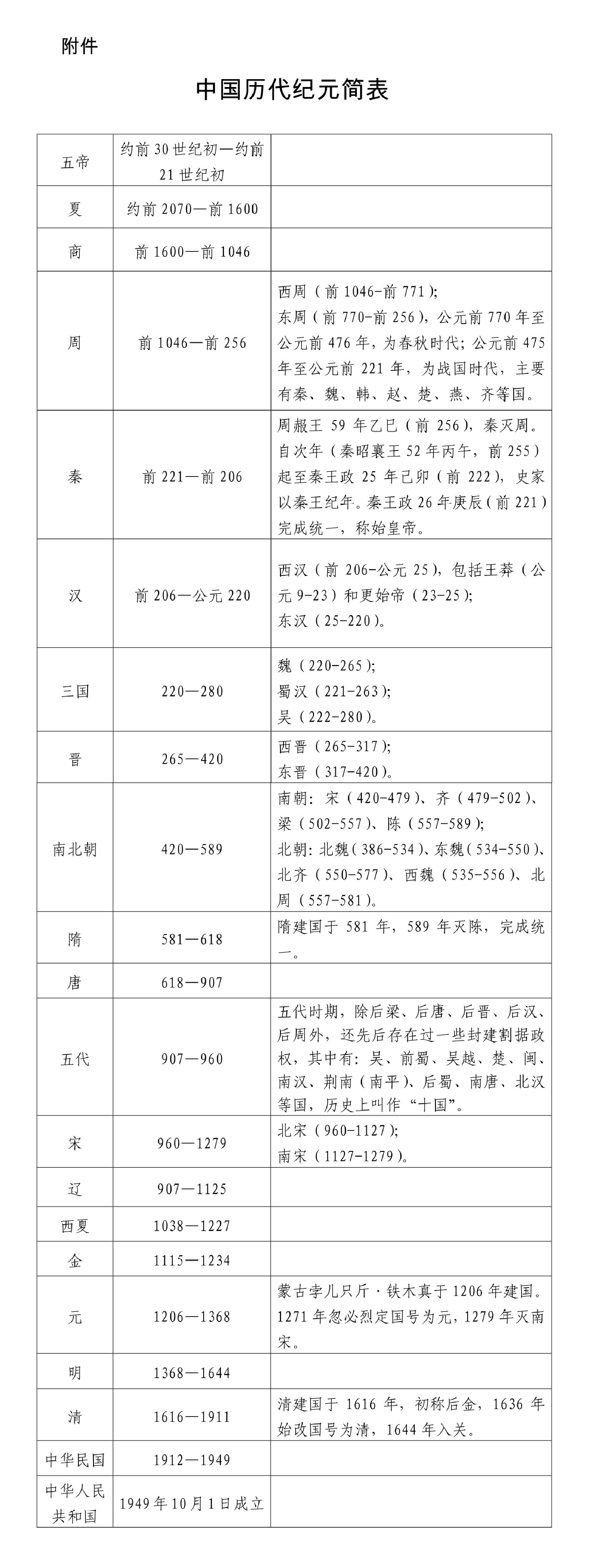









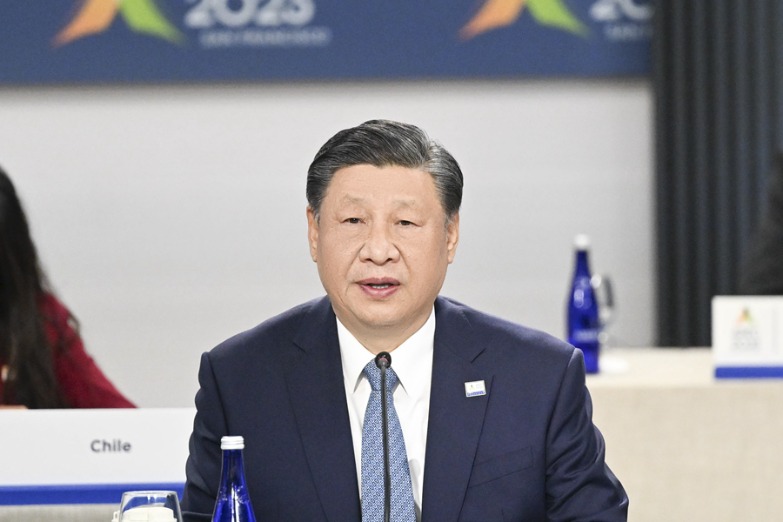

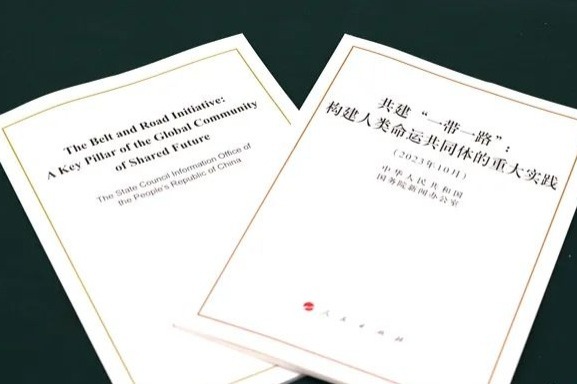
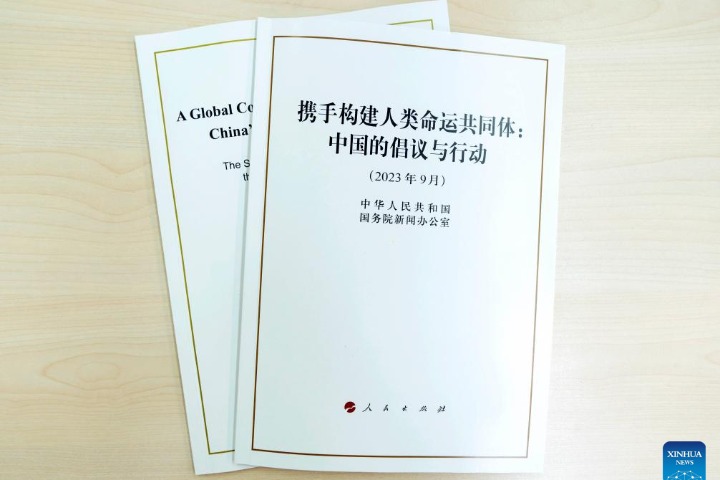
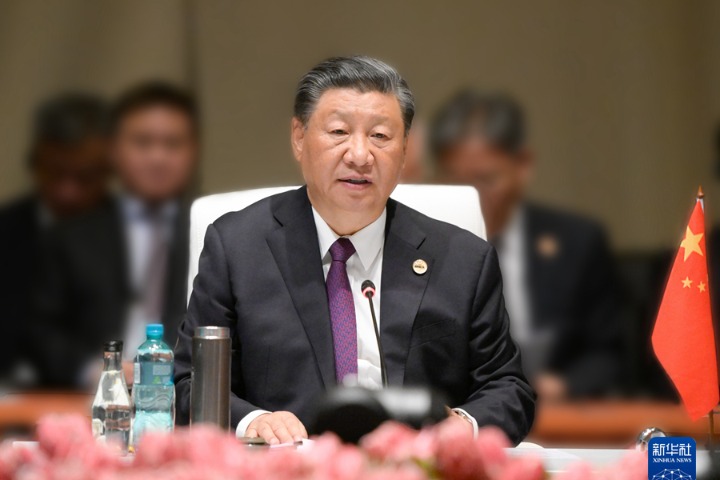



 英语点津微信
英语点津微信 双语小程序
双语小程序